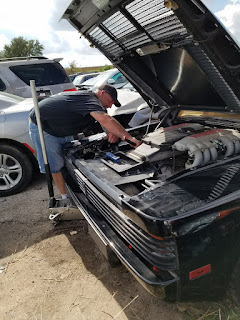When the electronics get wet it can cause them to short circuit. Water acts like a conductor and can cross your power and ground, it can short out computers (BCM, ECM, PCM), modules, electric motors (window, sunroof, electric seat, etc.), relays, starters, alternators, or your battery.
In the event that your interior becomes wet it is not a good idea to let it stay wet very long, it can quickly mildew, rust the floorboards, and evaporating water can penetrate any surviving electronics or interior parts not already affected. Use a shop-vac to remove as much water as possible from the carpet, seats, door panels, center console, glove compartment, trunk, and any other place holding water.
It is very difficult for water to enter the differential of a vehicle but it is not unheard of, water in the differential can cause excess friction leading to damage of the gears. We recommend a differential flush after a high water incident.
As little as 1 ounce of water in your transmission can also lead to big problems often requiring a rebuild or replacement. The key to preventing major damage is to catch it early, as soon as you are aware of the possibility of water in the transmission you should have your fluid changed. Wards Mobile Mechanic does not offer transmission services, we recommend Transpro on Nasa RD 1.
In the event that your interior becomes wet it is not a good idea to let it stay wet very long, it can quickly mildew, rust the floorboards, and evaporating water can penetrate any surviving electronics or interior parts not already affected. Use a shop-vac to remove as much water as possible from the carpet, seats, door panels, center console, glove compartment, trunk, and any other place holding water.
It is very difficult for water to enter the differential of a vehicle but it is not unheard of, water in the differential can cause excess friction leading to damage of the gears. We recommend a differential flush after a high water incident.
As little as 1 ounce of water in your transmission can also lead to big problems often requiring a rebuild or replacement. The key to preventing major damage is to catch it early, as soon as you are aware of the possibility of water in the transmission you should have your fluid changed. Wards Mobile Mechanic does not offer transmission services, we recommend Transpro on Nasa RD 1.
If water gets in through the air filter it can get inside your cylinders and hydrolock your engine. When an engine hydrolocks it can affect a single cylinder or all of them, it can bend the connecting rods, destroy the crankshaft bearings, break the crankshaft, crack the heads or the engine block since it cannot compress water. Remove the air filter, once it is removed when turning the key if you only hear a 'clunk' sound then your engine is hydrolocked. To remove the water from the cylinders you must remove all the spark plugs and crank the engine to pump the water out of the spark plug holes. If after removing the spark plugs you still only hear a 'clunk' you may have a bad starter or more likely already bent a connecting rod and must either rebuild or replace your engine. If your engine does roll over after removing the spark plugs crank on it in 60 second intervals (for no more than 60 seconds at a time, then allow it to cool for 60 seconds) until all the water has ejected from the spark plug holes. Once the engine has pumped all the water out of the spark plug holes replace the spark plugs and a dry air filter. *NOTE: On some vehicles you have to remove the intake manifold and dump the water out of it due to their position or the water will not fully evacuate.
We are available to assist you Monday-Saturday 8am-5pm, give us a call to schedule your appointment.
Wards Mobile Mechanic
Spring, TX

Comments
Post a Comment